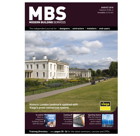Collaborative approach

“In our features this month, the themes of integration and a collaborative approach are high on the agenda.
With increasingly complex buildings and occupant requirements, building services professionals face a very real challenge when it comes to providing a building that works as a system - efficient, effective and as-designed.
But it’s easier said than done because construction itself is far from collaborative.
The system-view of a building only works if it’s done that way from the start. Silo thinking and value engineering almost always lead to poorly performing buildings. Collaboration means that everyone knows the end game is a building that works effectively, and strives to deliver that.
Even simple ideas such as optimising daylighting to save energy by coordinating lighting control with window blinds require those two elements to be planned from the start. Value engineering out that lighting control system is a no-no because that would lead to problems for the owner/occupier who is left wondering why the lights don’t integrate with the blinds. Yet it happens all the time, and not just with building controls.
There are many examples of the collaborative approach creating much better outcomes for clients. In this issue we consider how teamwork met tight deadlines for the largest data centre in Europe (click here); or how delivery of a sophisticated leisure centre required early engagement with everyone in the project team (click here).
A collaborative approach to working also makes it easier to adopt new technologies, because they can be planned in from the very early stages of a project. This is particularly important as regulations such as F Gas and ErP are pushing end-users to seek out products that meet legal requirements on refrigerants, for example. With products such as hybrid VRF (see page 24) providing potential solutions, it’s vital that the team understands how that new approach will work within a project - and integrate with other aspects of the build.
Of course, collaborative working isn’t a new idea. Reports have been calling for more of it in construction for decades. But technology is a great driver, and it may be that new products and techniques will necessitate a change in approach across the construction sector and building services.”
Karen Fletcher







